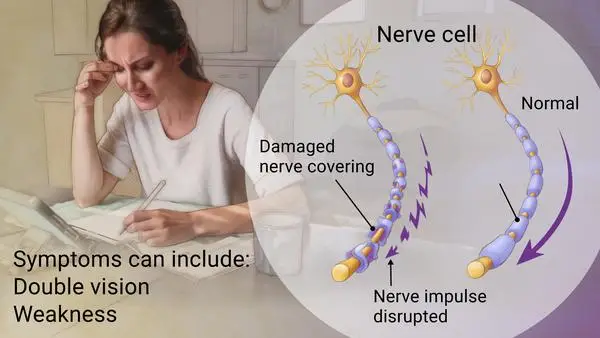A disease in which the immune system eats away at the protective covering of nerves.
In MS, resulting nerve damage disrupts communication between the brain and the body.
Multiple sclerosis causes many different symptoms, including vision loss, pain, fatigue, and impaired coordination. The symptoms, severity, and duration can vary from person to person. Some people may be symptom free most of their lives, while others can have severe chronic symptoms that never go away.
Physical therapy and medications that suppress the immune system can help with symptoms and slow disease progression.
Symtoms
People may experience:
Pain areas: in the back or eyes
Pain circumstances: can occur in the back due to head nod or with eye movement
Tremor: can occur during precise movements, in the hands, or limbs
Muscular: cramping, difficulty walking, inability to rapidly change motions, involuntary movements, muscle paralysis, muscle rigidity, muscle weakness, problems with coordination, stiff muscles, clumsiness, muscle spasms, or overactive reflexes
Whole body: fatigue, dizziness, heat intolerance, poor balance, or vertigo
Sensory: pins and needles, abnormality of taste, reduced sensation of touch, or uncomfortable tingling and burning
Urinary: excessive urination at night, leaking of urine, persistent urge to urinate, or urinary retention
Visual: blurred vision, double vision, or vision loss
Sexual: erectile dysfunction or sexual dysfunction
Mood: anxiety or mood swings
Speech: difficulty speaking or slurred speech
Also common: constipation, depression, difficulty swallowing, difficulty thinking and understanding, flare, headache, heavy legs, numbness of face, rapid involuntary eye movement, sleep deprivation, tongue numbness, weakness, or difficulty raising the foot




